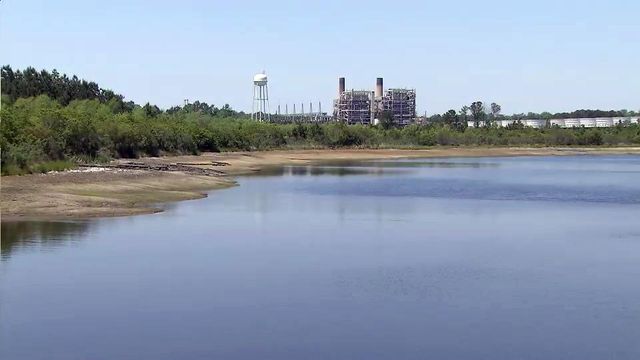Duke Energy proposes $102M settlement of federal coal ash charges
Duke Energy was charged Friday with nine counts of violating the federal Clean Water Act in connection with the handling of coal ash at its North Carolina power plants, including one that spilled tons of ash into the Dan River a year ago.
Posted — UpdatedThe Charlotte-based utility said it has agreed to pay $68 million in fines and restitution and another $34 million in mitigation costs and community service efforts to settle the case. Any such agreement must be approved by a federal judge.
The U.S. Attorney's Office in Raleigh declined to comment on any proposed settlement in the case, but federal court documents indicate that criminal informations have been filed in all three federal judicial districts in North Carolina and that Duke has agreed to plead guilty to the offenses. Prosecutors typically file a criminal information when a plea deal is in place and there is no need to seek a formal grand jury indictment.
The criminal charges stem from the Feb. 2, 2014, spill of about 39,000 tons of the toxic ash into the Dan River from Duke's shuttered plant near Eden, as well as maintenance problems at the Cape Fear Steam Electric Plant in Moncure and leaks from ash ponds in Eden and at the Riverbend Steam Station in Mt. Holly, the H.F. Lee Steam Electric Plant in Goldsboro and the Asheville Steam Electric Generating Plant into nearby surface waters.
Each violation carries a maximum penalty of five years on probation, fines and restitution.
Duke President and Chief Executive Lynn Good said the company is addressing each of the issues through facility improvements or new permitting.
"We are accountable for what happened at Dan River and have learned from this event," Good said in a statement. "We are setting a new standard for coal ash management and implementing smart, sustainable solutions for all of our ash basins. Our highest priorities are safe operations and the well-being of the people and communities we serve."
Coal ash is the material left after coal is burned for fuel. While the bulk of it is inert, it does contain heavy metals and other toxins, including arsenic, chromium, selenium and mercury, that can harm fish, wildlife and people.
Despite containing those toxins, coal ash has been stored in unlined storage ponds for decades by Duke and other North Carolina power generators. Those ponds are perched along the same waterways from which the utilities have drawn water for their steam stations – and from which millions of North Carolinians draw their drinking water.
Two weeks after the Dan River spill, a federal grand jury began looking at both the cause of the spill and the relationship between Duke and state regulators over several years.
The spill also caught the attention of state lawmakers, who last August passed legislation requiring Duke to close all of its ash ponds by 2029 and creating a state commission to set a priority schedule for the process and monitor it through its completion.
Drew Elliott, a spokesman for the state Department of Environment and Natural Resources, said any settlement doesn't affect the agency's civil suit against Duke over violations at its coal ash ponds or Duke's obligations under the state's Coal Ash Management Act.
"DENR is pleased to see that the U.S. Department of Justice has conducted a thorough investigation into environmental crimes committed by Duke Energy and that several of the criminal counts against Duke Energy are consistent with the allegations contained in DENR’s civil lawsuits filed against the utility in 2013," Elliott said in a statement.
Frank Holleman, senior attorney for the Southern Environmental Law Center, said his group informed Duke and DENR of the Clean Water Act violations two years ago, but no ash pond has been cleaned up as yet.
"Duke Energy cannot buy its way out of its coal ash scandal, it has to clean its way out," Holleman said in a statement. "Duke Energy and its executives must show the people of North Carolina that they are sorry for these crimes by moving the dangerous and polluting coal ash to safe, dry, lined storage away from our rivers and drinking water supplies.”
Amy Adams, North Carolina campaign coordinator for the Appalachian Voices environmental group and a former DENR supervisor, agreed that the criminal charges and a proposed settlement are only a first step in the process.
"It’s good to see Duke acknowledge its culpability. However, we have yet to see that culpability turn into real action," Adams said in a statement. "Important questions remain, like exactly how the money will be spent and whether any individuals will be named, but most troubling is the currently unanswered question of whether DENR was aware of negligence and failed to act or was unable to recognize the magnitude of the situation in the first place.”
Duke said that its proposed settlement with the government includes a five-year probationary period and a court-appointed monitor to ensure compliance with all provisions.
The company would be required to submit environmental compliance plans to the court, including additional training, audits, reporting and other measures related to ash basins. It also would create an evaluation and claims process to help towns modernize their water treatment systems if they have been impacted by increased bromides from environmental equipment installed at certain coal plants.
Duke officials said shareholders, not customers, would absorb the $102 million cost of the proposed settlement.
Shareholders also are on the hook for the cleanup costs along the Dan River, company officials have said, but the utility plans to seek rate increases to pay for the costs of associated with closing other ash ponds.
On Wednesday, Duke reported net income of $1.9 billion for 2014, down from $2.7 billion in 2013.
• Credits
Copyright 2024 by Capitol Broadcasting Company. All rights reserved. This material may not be published, broadcast, rewritten or redistributed.






